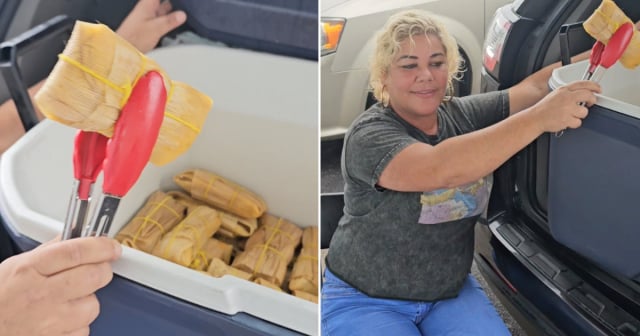Ariel Valdés Pinto, originally from Mayajigua, Sancti Spíritus, is succeeding in Tenerife with a sugarcane juice called guarapo that he cuts himself in the traditional way: with a machete. He sells his guarapo natural as well as with lime, mint, passion fruit, prickly pear (a superfood), and rum.
In the videos he shares on TikTok, this Cuban farmer explains that he cuts the sugar cane at seven in the evening so that it arrives fresh the next day at his guarapo stand in Tacoronte, a municipality of Santa Cruz de Tenerife, on the Island of Tenerife, one of the seven archipelagos that make up the Canary Islands.
"Friends and followers, here we are collecting the cane so it can arrive fresh at the Africa market," he says, showing a large one while clearing it with his machete. "Look at this, don't let anyone tell you. Look at the quality of this cane," he adds.
In the sugarcane fields of Lomo de la Vieja, in Tacoronte, from where Valdés Pinto sources the raw material for his guarapo, this Cuban farmer from Mayajigua selects among various types of cane: the Cinta cane, which is six meters long, not including the leaves; but also the Media Luna, "the softest cane in the world," of which he invites you to enjoy a small piece, while being recorded planting its "eyes" in the furrow. As he explains, it will be ready for harvest in a year.
One of his followers, who resides on the island of Hierro (Canary Islands), agrees and recalls that in Cuba it was said that the biggest plague that the Media Luna sugarcane could have was people, because it was so soft that they would eat it.
Ariel Valdés Pinto keeps his followers informed about the progress of the new planting of Cinta sugarcane, which is already starting to grow on his land. Furthermore, he tells his audience that he goes from the market "directly from selling to planting sugarcane."
"Fifteen and eighteen hours of daily work. This doesn't fall from the sky. This is a sacrifice," he explains to his audience, assuming that sticks with pleasure don't hurt. "Everyone with what they like," he says.
Cuban entrepreneurs
Many Cubans start their businesses after emigrating. In the United States, where the bulk of Cuban emigration is concentrated, the flavors of the Island thrive. In Spain, where Valdés Pinto lives, it is more difficult because Cuban cuisine, apart from being largely unknown, is hyper-caloric, and the Spaniards try it but find it hard to return to it due to their diet concerns. Nevertheless, entrepreneurs like Alejandro Ramírez have managed to establish Cuban restaurants on the coast of Alicante.
Ariel Valdés Pinto has an easier time with guarapo because it is a well-known drink in the Canary Islands, although it is believed to have arrived there from the tropical coast of Málaga and Granada. In any case, the Canarians appreciate its flavor and benefits.
What do you think?
COMMENTFiled under:
